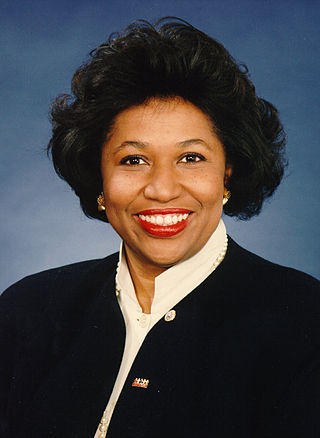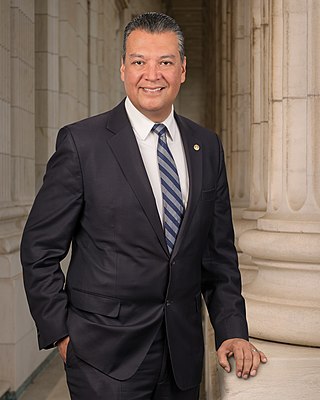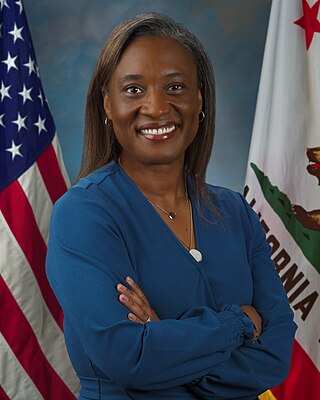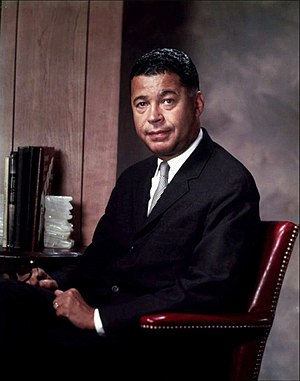
Carol Elizabeth Moseley Braun, also sometimes Moseley-Braun, is an American diplomat, politician, and lawyer who represented Illinois in the United States Senate from 1993 to 1999. Prior to her Senate tenure, Moseley Braun was a member of the Illinois House of Representatives from 1979 to 1988 and served as Cook County Recorder of Deeds from 1988 to 1992. She was elected to the U.S. Senate in 1992 after defeating Senator Alan J. Dixon in a Democratic primary. Moseley Braun served one term in the Senate and was defeated by Republican Peter Fitzgerald in 1998.

From the first United States Congress in 1789 through the 116th Congress in 2020, 162 African Americans served in Congress. Meanwhile, the total number of all individuals who have served in Congress over that period is 12,348. Between 1789 and 2020, 152 have served in the House of Representatives, 9 have served in the Senate, and 1 has served in both chambers. Voting members have totaled 156, with 6 serving as delegates. Party membership has been 131 Democrats and 31 Republicans. While 13 members founded the Congressional Black Caucus in 1971 during the 92nd Congress, in the 116th Congress (2019-2020), 56 served, with 54 Democrats and 2 Republicans.

Blanche Kelso Bruce was an American politician who represented Mississippi as a Republican in the United States Senate from 1875 to 1881. Born into slavery in Prince Edward County, Virginia, he went on to become the first elected African-American senator to serve a full term.

The Congressional Black Caucus (CBC) is a caucus made up of African-American members of the United States Congress. Representative Steven Horsford from Nevada is the caucus chairperson, having succeeded Joyce Beatty from Ohio in 2023.

Hiram Rhodes Revels was an American Republican politician, minister in the African Methodist Episcopal Church, and a college administrator. Born free in North Carolina, he later lived and worked in Ohio, where he voted before the Civil War. Elected by the Mississippi legislature to the United States Senate as a Republican to represent Mississippi in 1870 and 1871 during the Reconstruction era, he was the first African American to serve in either house of the U.S. Congress.

These are tables of congressional delegations from Indiana to the United States House of Representatives and the United States Senate.
This article covers the history of women in the United States Senate and various milestones achieved by female senators. It includes a list of all women who have served in the Senate, a list of current female senators, and a list of states represented by women in the Senate. The first female U.S. senator, Rebecca Latimer Felton, represented Georgia for a single day in 1922, and the first woman elected to the Senate, Hattie Caraway, was elected from Arkansas in 1932. Sixty women have served in the upper house of the United States Congress since its establishment in 1789. As of October 3, 2023, there are 25 women serving as U.S. senators. Additionally, Kamala Harris as vice president serves as President of the Senate.

Alejandro "Alex" Padilla is an American politician serving as the senior United States senator from California, a seat he has held since 2021. A member of the Democratic Party, Padilla served as the 30th secretary of state of California from 2015 to 2021 and was a member of the California State Senate and the Los Angeles City Council.

Kamala Devi Harris is an American politician and attorney who is the 49th and current vice president of the United States under President Joe Biden. She is the first female vice president and the highest-ranking female official in U.S. history, as well as the first African-American and first Asian-American vice president. A member of the Democratic Party, she was previously attorney general of California from 2011 to 2017 and a U.S. senator from California from 2017 to 2021.

Marcia Louise Fudge is an American attorney and retired politician who served as the 18th United States Secretary of Housing and Urban Development from 2021 to 2024. A member of the Democratic Party, she served as the U.S. representative for Ohio's 11th congressional district from 2008 to 2021. The district included most of the black-majority precincts between Cleveland and Akron.

African-American candidates for president of the United States from major parties include U.S. Senator Barack Obama (D-IL), elected president of the United States in 2008. He was the first African American to win a presidential election and the first African American to serve as president of the United States. He was re-elected as president in 2012. There had been several candidates in the years before.
Asian Americans represent a growing share of the national population and of the electorate. The lower political participation of Asian Americans has been raised as a concern, especially as it relates to their influence on politics in the United States. Asian Americans were once a strong constituency for Republicans. In 1992, George H.W. Bush won 55% of Asian voters. In the 21st century, Asian Americans have become a key Democratic Party constituency.
Black women have been involved in American socio-political issues and advocating for the community since the American Civil War era through organizations, clubs, community-based social services, and advocacy. Black women are currently underrepresented in the United States in both elected offices and in policy made by elected officials. Although data shows that women do not run for office in large numbers when compared to men, Black women have been involved in issues concerning identity, human rights, child welfare, and misogynoir within the political dialogue for decades. Women in government are preferred by ethnic minorities over their White colleagues. Researchers studying black politics have discovered that White voters have prejudices towards Black candidates. Descriptive representation is important for Black voters. Black women's positional behavior and ideology are influenced by a distinctive Black female consciousness. Support for Black women candidates among Black women may result from a prioritization of racial concerns above gendered interests.

A special election was held on June 6, 2017, to elect the member of the United States House of Representatives for California's 34th congressional district. A special open primary election was held on April 4, 2017.

The 2020 presidential campaign of Kamala Harris, a United States senator from California from January 2017 to 2021, officially began on January 21, 2019, with an announcement on Good Morning America. Harris had widely been considered a "high profile" candidate for the 2020 Democratic Party presidential primaries since 2016.

Laphonza Romanique Butler is an American labor union official and politician serving as the junior United States senator from California since 2023. Butler began her career as a union organizer, and served as president of California SEIU State Council from 2013 to 2018. A member of the Democratic Party, she was a regent of the University of California system from 2018 to 2021, and the president of EMILY's List from 2021 to 2023.




























